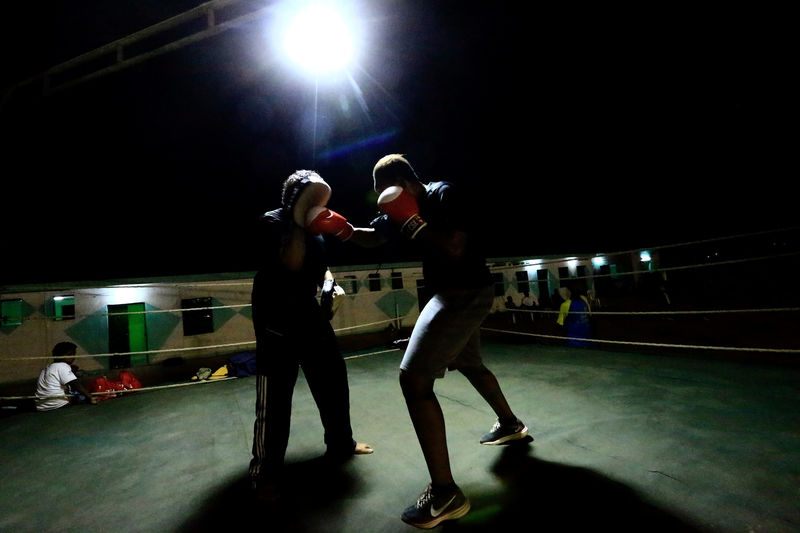By Khalid Abdelaziz
KHARTOUM (Reuters) - Sweat drips from Arafat Abkar's brow as she dodges blows in an open-air arena in Khartoum's searing summer heat. Wearing only shorts and a t-shirt, the 22-year-old draws crowds in a country where Muslim mores mean women's boxing is a rare spectacle.
"When I train, more spectators watch because women's boxing is new and unfamiliar in Sudan," Abkar said proudly at the private Nile Club in the south of the city.
Sudan is ruled by Islamic law, which requires women to dress modestly. So, when she's in the street, Abkar follows the fashion by wearing loose, flowing garments and covering her hair.
In the ring, however, her bare head and defined muscles mark her out for criticism and ridicule. That is a price Abkar is willing to pay.
"People mock women who box. They think it's not feminine but they're wrong ... I don't think this sport will stop me getting married. So far, we've faced no objections from anyone, governmental or otherwise," she said.
Most families are not so supportive and another girl at the club said she boxed in secret as her family would object to her taking part in what they see as a man's sport.
Women's boxing was unheard of in Sudan until four years ago, when Sahar Mohamed took up the sport and represented her country at the All Africa Games last year. She was defeated on points in the Middleweight category by Yannick Azangue of Cameroon.
Since then, the Sudan Amateur Boxing Federation has sought to encourage women to join the sport despite social challenges.
"Four years ago, I was the first Sudanese girl to box and I faced big pressures from my family and people but I'll continue as this is my life's dream," said Mohamed at a state-run youth centre in Khartoum, where she trains.
Nearby, two women were training alongside men, shouting as they jumped from foot to foot and punched each other with worn gloves. The equipment is worn and basic, but the centre is busy, the atmosphere buzzing with young people practicing everything from martial arts to football.
"People watch satellite channels and look on the internet and that has changed the culture and given new courage to women in the past few years to pick up boxing gloves," Mohamed Yousef, head of the Sudanese national boxing team, said.
"The Sudan Boxing Federation asked us put more emphasis on girls to encourage them to continue in the sport."
Ali al-Aqraa, 78, a retired Sudanese boxing champion and the first to begin training women said a lack of funds, not enthusiasm, was the biggest hurdle.
Abkar was Sudan's weight-lifting champion and represented her country abroad before taking up boxing last year. She is one of four women on the boxing team at the Nile Club, where she trains three times a week.

"What pushed me to box was watching American champion Laila Ali," she said, referring to the daughter of boxing legend Mohamed Ali. "As I train night and day her image is in my mind. I hope to become a world champion like her."